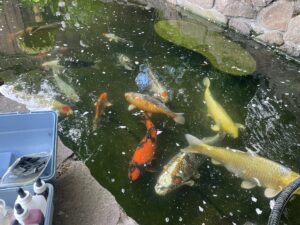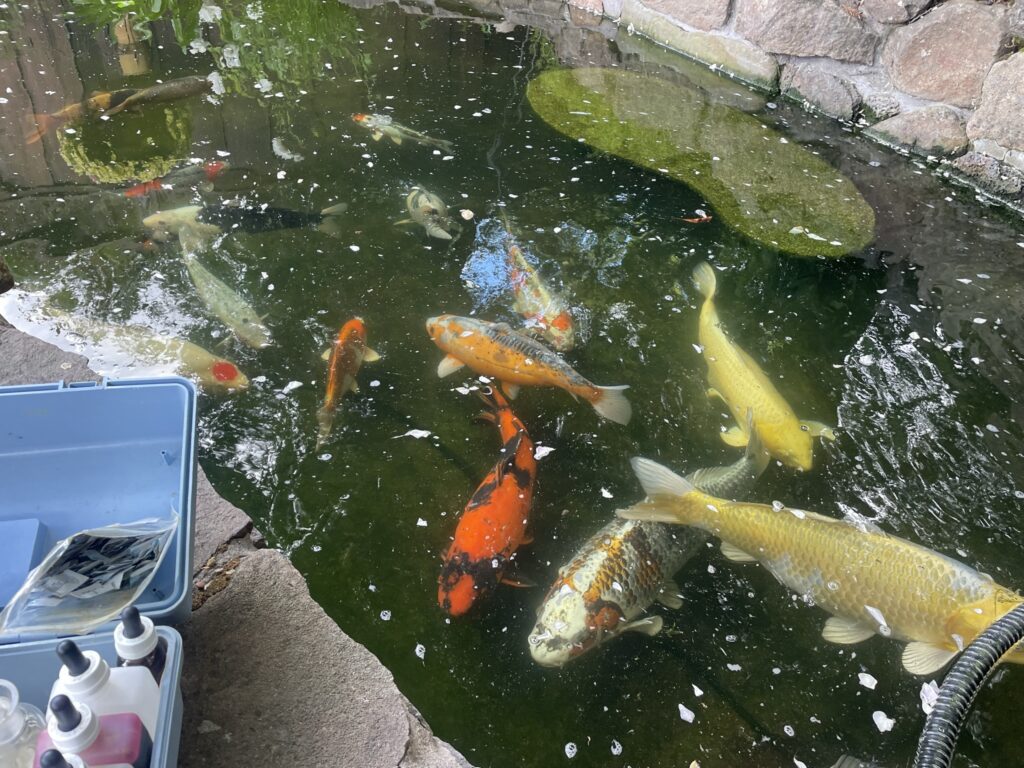**Post contains affiliate links.**
We are asked by many of our koi clients if koi require a heater in the winter. If you are looking into a koi pond heater, here are a few things to consider prior to making the big purchase.

Should I heat my koi pond?
The simple answer is no; you do not need to heat your koi pond. Koi are poikilotherms and can tolerate a very wide temperature range. As long as they are not frozen solid, they will survive low temperatures by entering tupor, a semi-hibernative state. This is a completely normal part of their life cycle and will not cause significant health issues. Caution should be taken as temperatures fluctuate throughout the year to ensure your fishes’ behavior matches the water temperature.
What are the benefits of using a koi pond heater?
The key benefit of using a koi pond heater is to maintain a fish within their optimal temperature range. For koi, they have difficulty mounting a robust immune response at temperatures below 60F (15.5C). If you have a fish that is sick or debilitated, they will continue to fight off pathogens, but can get ill quicker. Mostly, heaters are recommended for injured fish with secondary bacterial infections, such as coelomic perforations. Warmer temps also stimulate improved appetite which is critical for proper healing.
Koi Pond Heater vs De-Icer
If you live in an area at risk of a full-thickness freeze, you will need something to keep your fish from turning into blocks of ice. Rather than a full pond heater, you may need a de-icer to keep just part of your pond surface ice free. This will allow oxygen to get into the water and travel down to your fish while preventing a full thickness freeze. Learn more about caring for koi ponds in winter.
Guide to Koi Pond Heaters
Koi pond heaters come in three types: gas-fired boiler with heat exchanger, in-line electric water heater and large aquarium heaters. The type of koi pond heater best for your pond will depend on your budget, size of pond and temperature variation.
Gas-Fired Boiler Pond Heaters
Although not specifically designed for koi ponds, these systems are designed to heat water for many different applications. They require a source of gas that will heat the water as it is being pumped through the system and then returned to your pond. Unless your pond is very large, this type of system may be overkill.
In-line Koi Pond Heaters
As the name suggests In-Line Koi Pond Heaters are plumbed into your ponds filtration system. This uses electricity to heat your pond water and are less powerful than the gas-fired versions. There are models that are made specifically for ponds but recommend professional installation.
Large Aquarium Heaters
Like indoor tanks, large heating elements can be put into ponds. With our previous hospital, we used these for our 250-500 gallon systems. This is a more static system and will only heat the immediate area around the heater, so good circulation is critical to overall pond heat distribution. If you are interested in only heating a small portion of your pond and allowing a warm to cold gradient, these types of heaters are a good choice. Here is an example of one that is designed to heat up to 500 gallons.
Be sure your fish cannot rest touching the heating element. This can cause burns that will be difficult to treat. Try to place your heater in an area the fish cannot access, but gets good water flow.
No matter what method you choose, if you choose to heat your koi pond, always check to ensure your heater is working correctly by regularly checking your water temperature with a reliable pond thermometer.

